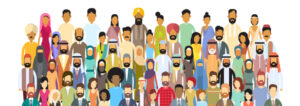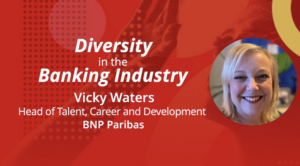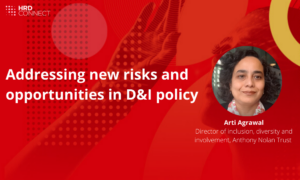The American dream: An unattainable goal for diverse job-seekers
- 5 Min Read
The American dream purports to offer happiness and prosperity to all – but is this really the case? Headstart’s Gareth Jones investigates further, explaining why systemic issues in the world of recruitment are preventing many diverse job-seekers from reaching their true potential.
- Author: Gareth Jones
- Date published: Dec 2, 2020
- Categories

“We hold these truths to be self-evident, that all men are created equal, that they are endowed by their creator with certain unalienable rights, that among these are Life, Liberty, and the pursuit of Happiness.”
That’s part of the preamble to the United States Declaration of Independence. In a few dozen words, the founders of the United States outlined a philosophy upon which to build a nation.
Notice, in particular, the parts that state that we’re all equal, and all have a right to the pursuit of happiness. This is the seed from which the American dream sprouted.
The American dream is a promise — it says that, through hard work and determination, everyone should be able to achieve the highest place in society that they’re capable of. What’s more, it posits that they should be able to do this regardless of, as novelist James Truslow Adams put it, “the fortuitous circumstances of birth or position”.
This promise has been broadcast all over the world, and has attracted countless hardworking people to the US to fulfill their own dream. The American dream is strong, it’s survived generations — and 90% of American job seekers still believe it’s an important aspiration today.
We spoke to 400 job seekers and 400 hiring managers about discrimination and opportunity.
Here’s what they had to say.
— Headstart (@Headstart_io) October 21, 2020
The American dream says that if you work hard enough, you can achieve anything. In practical terms, that normally includes property or, at the very least, financial stability, social mobility, and comfort.
Employment is obviously critical to any of these goals, and we’re becoming increasingly aware of this weak link in the chain from promise to fulfillment.
Data and research are gradually revealing a vast and troubling trend of discrimination in recruiting. Whether unconscious or not, it would appear that factors such as ethnicity, age, gender, sexual orientation, or disability, are blocking Americans from attaining their version of the dream, despite their capabilities and work ethic.
The American dream isn’t a promise to everyone
America purports to be a meritocracy; a system in which wealth and power are distributed according to capabilities and performance. In reality, it seems that our society attributes more worth to the merits of white, straight, cisgender, neurotypical, and non-disabled people. What about everyone else? Doesn’t the promise of opportunity extend to them too?
In September this year, we surveyed 800 American job-seekers and employers. We found that 54% of job-seekers feel they’ve been frequently discriminated against in the job market. For Black Americans, that number is 66%, and as high as 83% for gender-diverse job seekers. Even among the candidates who make it through the gauntlet of discrimination, 34% of job -seekers report that they felt discrimination in the recruiting process.
The upshot is that the dream feels unattainable. When asked about their perception of the American dream, sexual or gender diverse respondents were 158% more likely than their straight, cis counterparts to feel that it was out of their reach.
On the other side of the interview table, 42% of hiring managers report not having completed any unconscious bias or discrimination training. Of those who have, 67% suspect that bias and discrimination is an issue in their organization.
These numbers are telling us a clear story, one about opportunity for some, and barred doors for others.
In one of the most diverse nations on Earth, with an economy driven by more immigrants than any other country, these numbers tell a deeply troubling tale. They reveal that meritocracy is in fact built upon the backs of marginalized groups who are denied opportunity, while simultaneously being told that if they work hard, they’ll get there someday. The American dream is, in reality, nothing but a carrot on a string for too many Americans.
A lack of opportunity means financial insecurity, self-doubt, and shame
So what does this mean in the day-to-day lives of countless Americans? As mentioned, when we get right down to it, the American dream is about financial independence and all that it brings. It’s about a free lifestyle, owning your own home, supporting your family, educating yourself — it’s about choice.
When a perfectly capable and driven candidate is denied an opportunity that they deserve, they’re also denied these rewards. Moreover, they’re given a signal that they aren’t as valuable as others, that they aren’t as smart or talented as they thought they were, and that they don’t have as much to contribute as their peers.
When you’re looking at a single rejection, it feels like it’s all on you. When you experience failure, you don’t necessarily notice the systemic discrimination that’s running the show (and has been for centuries). As a result, it’s worryingly common for diverse job seekers to feel ashamed, and to blame themselves for their lack of progress.
Fortunately, that systemic discrimination is being discovered by statistics and data science. With an understanding of what’s going on, recruiters with an eye to both the philosophy behind the American dream and the future that could be, can now take an active role in tearing down socioeconomic obstacles and making the American dream a reality for everyone.
We can do better
We’re failing to make the American dream attainable for millions of Americans. But it doesn’t have to be this way.
This is a problem that can only be solved at ground level. Recruiters are the gatekeepers of their industry, and the more aware they are of the role unconscious bias plays in recruiting, the more capable they are of creating change. Fortunately, there are tools to help.









